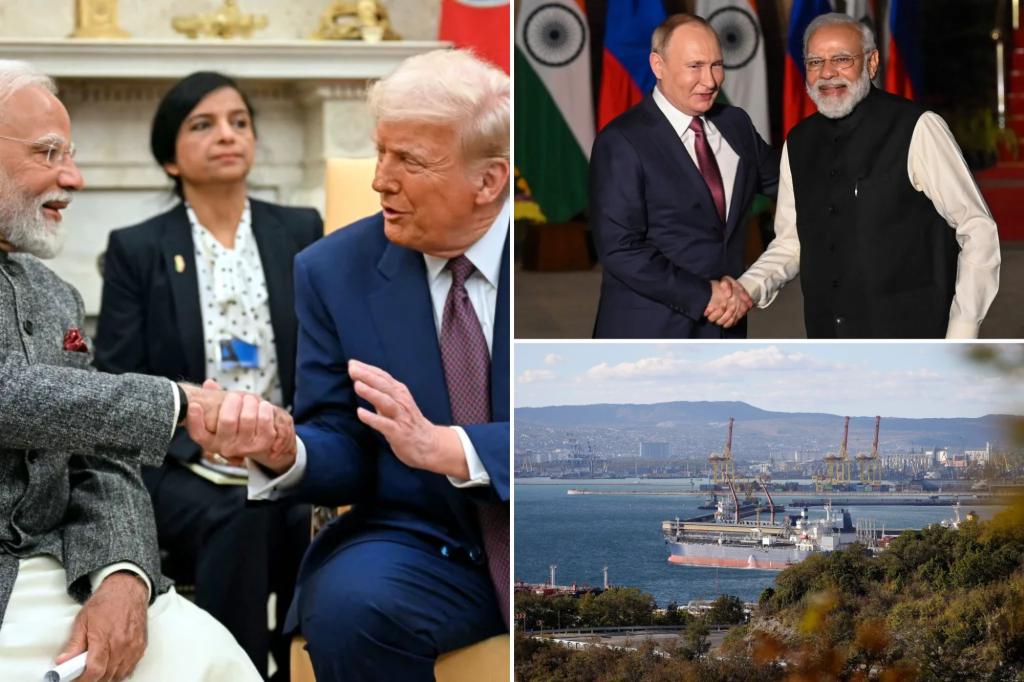Trump Doubles Tariffs on India to 50%, Citing Russian Oil Imports and iPhone Manufacturing Shift
U.S. President Donald Trump on Wednesday issued an executive order doubling tariffs on Indian imports from 25% to 50%, citing India's continued purchase of Russian crude oil. Trump accused New Delhi of undermining U.S. trade interests and aiding the Kremlin’s wartime economy.
According to the executive order released by the White House, the decision was made on the grounds that “the Government of India is currently directly or indirectly importing Russian Federation oil.”
 |
| Image Source: New York Post |
The move comes just 24 hours after Trump told CNBC that he would “very substantially” raise tariffs on India in retaliation for what he described as enabling Russia's war effort in Ukraine. “India has not been a good trading partner,” Trump said in the interview.
ALSO READ:
“They do a lot of business with us, but we don’t do business with them. So we settled on 25 percent (tariffs) but I think I’m going to raise that very substantially over the next 24 hours, because they’re buying Russian oil. They’re fueling the war machine.”
India has not yet officially responded to the tariff escalation. However, on August 4, the Ministry of External Affairs had issued a detailed and data-backed statement defending its energy procurement strategy.
It underscored that India’s purchases of Russian crude oil were driven by economic necessity and global supply disruptions--particularly after traditional energy suppliers shifted exports toward Europe following the Ukraine war.
The MEA highlighted that India's oil trade has been “targeted unjustifiably,” while many Western countries continue large-scale imports of Russian energy, including liquefied natural gas, uranium, and essential raw materials.
ALSO READ:
Trump's executive action also appears linked to broader dissatisfaction over global supply chain realignments. In recent months, major U.S. companies including Apple have shifted large segments of their production from China to India.
According to Canalys data cited by Bloomberg, India accounted for 44% of U.S. smartphone imports in the last quarter, surpassing China. Apple CEO Tim Cook confirmed in May that the majority of iPhones sold in the U.S. this year would have India as their country of origin.
This shift has not gone unnoticed by the Trump administration. In a May post on his Truth Social platform, Trump said, “I have long ago informed Tim Cook of Apple that I expect their iPhones that will be sold in the United States of America will be manufactured and built in the United States, not India, or anyplace else.”
Apple is expected to announce a U.S. investment later today. Most Apple products remain exempt from current tariffs while the Department of Commerce continues its ongoing Section 232 investigation.
Trump’s criticism of India forms part of a broader trade crackdown.
ALSO READ:
Move Coming in 24 Hours: Trump Threatens Steep Tariff Hike on India Over Russian Oil Trade Again
The newly announced global tariffs will reportedly affect most of America’s major trading partners, although the executive order singles out India for its alleged role in supporting Russia’s war economy and benefiting from reexporting Russian oil.
Trump’s rhetoric marks a sharp escalation from earlier phases of his presidency, when bilateral ties between New Delhi and Washington were seen as strengthening.
His recent comments have described India’s defense relationship with Moscow as a liability, stating that India “has always bought a vast majority of their military equipment from Russia.”
This new trade action could affect multiple key sectors of India’s economy that rely on exports to the U.S., including pharmaceuticals, textiles, information technology services, and mobile electronics.
The development adds further strain to India-U.S. trade relations at a time of rising geopolitical realignments, with BRICS countries increasingly coordinating responses to U.S. policy pressure.
On Tuesday, Indian National Security Advisor Ajit Doval arrived in Moscow to discuss strategic and energy cooperation.
The visit is seen by analysts as part of India’s calibrated foreign policy to preserve autonomy amid great power competition.
Trump’s latest move may also reverberate beyond bilateral trade, with ripple effects across global markets, particularly given India’s growing role in energy security, manufacturing, and digital infrastructure supply chains.
Whether the tariff doubling leads to retaliatory measures from India remains to be seen. This is a developing story.
To Stay Updated With Latest Updates From POTUS Trump, Click here
